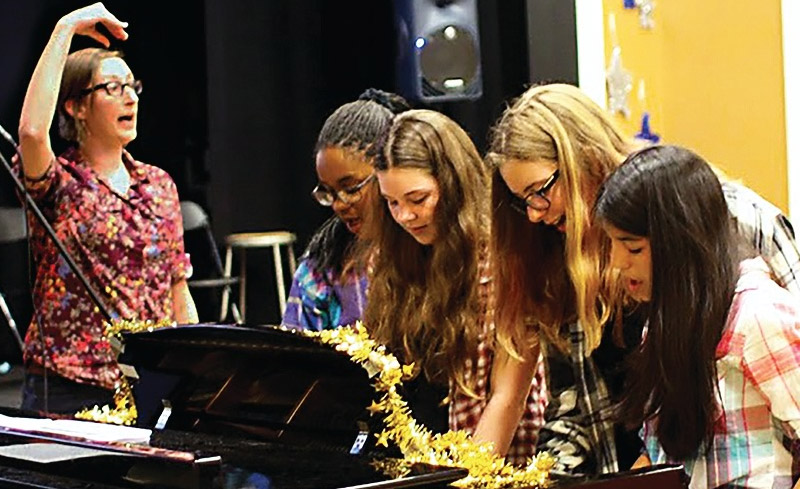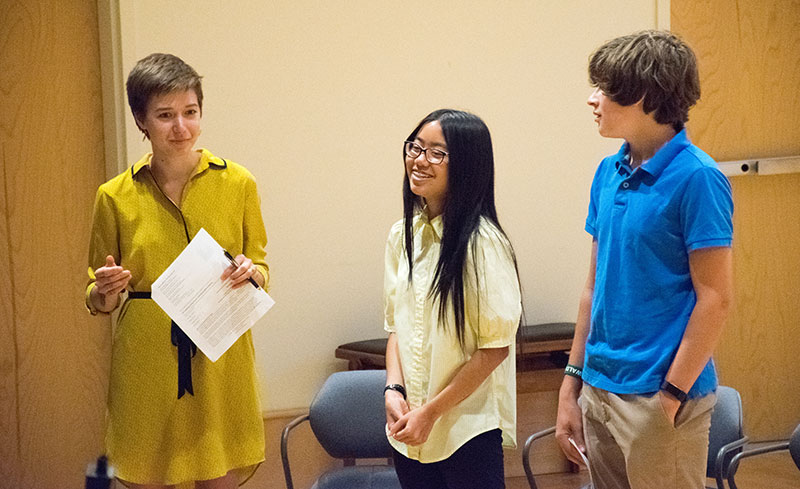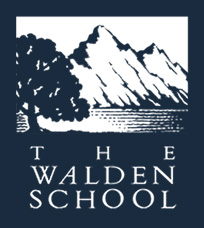Walden has a reputation for providing thorough and creative musical training for young musicians.
Our philosophy is rooted in a music education program developed more than 65 years ago. The Walden School Musicianship Course forms the cornerstone of our academic program. An organic approach to the study of music, the Musicianship Course encourages students to use the materials they study to create improvisatory works and original compositions. This method not only enhances students’ musical skills, but also develops a sense of creative individuality in extra-musical pursuits.
Walden Class Structure
Classes are deliberately small and geared to the individual student. Instructors use improvisation and composition as the primary tools in all levels of musicianship.
Specialty classes in music history and literature bring variety to the curriculum, while composition lessons offer one-on-one mentoring. All students, faculty, and staff participate in the Walden School Chorus, which meets daily and gives a concert at the end of the session.
Course offerings vary slightly each summer by the needs of the student body and the expertise of various faculty members. All students receive instruction in Walden’s core curriculum of musicianship, composition, and chorus. Weekly student Composers Forums and Walden School Concert Series supplement the classes.
Musicianship
Musicianship is the cornerstone of the Walden School’s academic program. Walden’s organic approach leads students to discover new materials and concepts for themselves.
Following discovery, they are given thorough aural, keyboard and written drill work in each area of study. Finally, they are encouraged to apply the materials to an improvisation or a composition.
Musicianship begins with a foundation in basic acoustics and proceeds through intervals, modes, and triads. Functional harmony, advanced/extended harmonic language, jazz musicianship, and analysis are next, among other topics.
Choral Singing
Singing has been integral to the life of the Walden School since its founding.
Each student, staff member, and faculty member participates in small choral groups and the all-school chorus. The Musicianship Course, the core of our program, incorporates singing to underpin each student’s musical fluency.
As we gather for each meal, we continue the tradition started in the 1950s. We sing one of the many in-house-composed blessings, reflecting the diversity of our community throughout the years. We also bring each day to a close by singing rounds and Goodnight Music. Finally, we sing together on our mountain hikes, celebrating our conquest of the summit and the inspiration we receive from each other and from nature.
Over the years the Walden School Choral Program has evolved from a single, all-school chorus to include smaller ensembles, providing age-specific training across choral groupings and mentoring from faculty conductors and student section leaders. Rehearsals are observed and feedback is exchanged in collegial one-on-one coaching sessions. Topics encountered include rehearsal tone and pacing, the role of the conductor as musical facilitator, and effective sequencing of musical goals.
Each choral rehearsal of the Walden School Choruses includes activities to develop natural body alignment, freedom of breath, confidence of intonation, diction, character, intention, and ease of vocal production.
Composers Forum
During Composers Forums, students present their improvisational or compositional works in a concert setting.
Works are performed by students, faculty, or visiting artists. Composers forums are overseen by an independent moderator, a faculty member or recognized composer, who leads a discussion of each piece. Students receive constructive feedback as a springboard toward further work, a unique opportunity for musical and personal growth. Forums are designed for the beginner as well as the advanced student, and are greatly beneficial to both. The emphasis on creative work at Walden is on process over product – works-in-progress are frequently performed alongside completed pieces. Walden composers forums are also style-inclusive, and types of works programmed include multimedia installations, choral and instrumental pieces, improvisations, memorized pieces, singer-songwriter works, and works performed by the composer.
In 2023, festival week Composers Forums will be moderated by YMP Composer-in-Residence Nicole Mitchell, and visiting composers forum performers throughout the summer will include members of TAK Ensemble and International Contemporary Ensemble.
Visiting composers forum performers in 2022 included members of International Contemporary Ensemble and Warp Trio. Past forum moderators have included George Lewis, Jennifer Higdon, Marcos Balter, Amy Beth Kirsten, Paula Matthusen, Lei Liang, Kati Agócs, Christopher Theofanidis, Samuel Adler, Thomas Benjamin, Martin Bresnick, Earle Brown, Andrea Clearfield, Randolph Coleman, James Freeman, Annie Gosfield, Adolphus Hailstork, Jean Eichelberger Ivey, Robert Kyr, Eugene O’Brien, Russell Pinkston, Philip Rosenberg, Allan Schindler, Alex Shapiro, Bright Sheng, John Weaver, and Chen Yi.
Computer Musicianship
Computer Musicianship is a course designed with two goals in mind:
First, to teach a composer the equipment, software and techniques associated with computer music. Second, to open a composer’s ear to the sounds of the natural world in which we live, perhaps the most fertile and rewarding source for new music.
The Walden School has been at the cutting edge of electronic music composition, performance, and pedagogy for more than 25 years. Our foundational course Computer Musicianship introduces students to recording techniques, composing with digital audio workstations (DAWs), and the history and repertoire of musique concrète. Through creative projects, repertoire study, and discussions, students expand the ways in which they listen to sound, conceive of music, and situate themselves in the world around them.
Since the first Computer Musicianship class in 1998, The Walden School has expanded its electronic music curriculum to cover some of the most important and innovative fields in electronic music. Recent subjects include improvisation in Max and/or Supercollider, multi-media composition, beat-making and IDM, modular synthesis in VCV Rack, DIY circuit design, and more. Walden’s electronic music curriculum continues the goals of Computer Musicianship by emphasizing creative work and thoughtful listening as a means of expanding students’ awareness of the world, increasing their understanding of technology, and empowering them to discover their own creative voices. The classes we offer cover experience levels ranging from complete beginner to an advanced student.
Enrichment
Enrichment courses are integral to Walden’s Young Musicians Program curriculum.
Enrichment Courses range from classes that focus on the development of particular skills (notation, rhythm, sight singing, score reading, conducting, et al.) to those that explore particular topics (film scoring, computer musicianship, orchestration, jazz improvisation, et al.) to courses in which students immerse themselves in the analysis and understanding of genres/historical periods of music (Stravinsky, Minimalism, jazz literature, et al.). Most faculty members will teach an enrichment (aka ‘specialty’) class each summer, and all students will be assigned to at least one of these courses each summer.
Recent enrichment classes have included: Film & Video Game Scoring, Instrumentation & Orchestration, Computer Musicianship, Comedy for Composers, Soul Food (learning performance and improvisation through jamming), Graphic and Text Scores, Making a Musical, Conducting, Medieval & Renaissance Music, and The Beauty of Our Modal World (music appreciation and performance of modal musics from around the globe).
Composition
Original composition is a fundamental outgrowth of Walden’s creative musical education.
Nearly all students compose at least one piece during the course of the summer, and many compose two or three. More than 100 new pieces are composed and improvised at Walden each summer. Every student has to chance to hear their work performed by the resident ensemble, faculty, fellow students, and/or guest artists.
At weekly Composers Forums, the composer, the performers, the audience and a moderator are invited to respond to improvisations and compositions presented in a concert setting. Moderators include guest composers invited to Walden and Walden faculty members.
At Walden, composition interacts with the input of professional performers, peers, and teachers. Students begin to discover and develop their own individual voices and creative ideas. Walden students learn to think independently and to discuss their creative work and their views. This discussion is refined through musical literature of varied genres, with special emphasis on contemporary concert music repertoire.
Our philosophy is rooted in a music education program developed more than 40 years ago. The Walden School Musicianship Course forms the cornerstone of our academic program. An organic approach to the study of music, the Musicianship Course encourages students to use the materials they study to create improvisatory works and original compositions. This method not only enhances students’ musical skills, but also develops a sense of creative individuality in extra-musical pursuits.
Walden Class Structure
Classes are deliberately small and geared to the individual student. Instructors use improvisation and composition as the primary tools in all levels of musicianship.
Specialty classes in music history and literature bring variety to the curriculum, while composition lessons offer one-on-one mentoring. All students, faculty, and staff participate in the Walden School Chorus, which meets daily and gives a concert at the end of the session.
Course offerings vary slightly each summer by the needs of the student body and the expertise of various faculty members. All students receive instruction in Walden’s core curriculum of musicianship, composition, and chorus. Weekly student Composers Forums and Walden School Concert Series supplement the classes.
Musicianship
Musicianship is the cornerstone of the Walden School’s academic program. Walden’s organic approach leads students to discover new materials and concepts for themselves.
Following discovery, they are given thorough aural, keyboard and written drill work in each area of study. Finally, they are encouraged to apply the materials to an improvisation or a composition.
Musicianship begins with a foundation in basic acoustics and proceeds through intervals, modes, and triads. Functional harmony, advanced/extended harmonic language, jazz musicianship, and analysis are next, among other topics.
Choral Singing
Singing has been integral to the life of the Walden School since its founding.
Each student, staff member, and faculty member participates in small choral groups and the all-school chorus. The Musicianship Course, the core of our program, incorporates singing to underpin each student’s musical fluency.
As we gather for each meal, we continue the tradition started in the 1950s. We sing one of the many in-house-composed blessings, reflecting the diversity of our community throughout the years. We also bring each day to a close by singing rounds and Goodnight Music. Finally, we sing together on our mountain hikes, celebrating our conquest of the summit and the inspiration we receive from each other and from nature.
Over the years the Walden School Choral Program has evolved from a single, all-school chorus to include smaller ensembles, providing age-specific training across choral groupings and mentoring from faculty conductors and student section leaders. Rehearsals are observed and feedback is exchanged in collegial one-on-one coaching sessions. Topics encountered include rehearsal tone and pacing, the role of the conductor as musical facilitator, and effective sequencing of musical goals.
Each choral rehearsal of the Walden School Choruses includes activities to develop natural body alignment, freedom of breath, confidence of intonation, diction, character, intention, and ease of vocal production.
Composers Forum
During Composers Forums, students present their improvisational or compositional works in a concert setting.
Works are performed by students, faculty, or visiting artists. Forums are overseen by an independent moderator, a faculty member or recognized composer, who leads a discussion of each piece. Students receive constructive feedback as a springboard toward further work, a unique opportunity for musical and personal growth. Forums are designed for the beginner as well as the advanced student, and are greatly beneficial to both. The emphasis on creative work at Walden is on process over product.
Past forum moderators have included Samuel Adler, Thomas Benjamin, Martin Bresnick, Earle Brown, Andrea Clearfield, Randolph Coleman, James Freeman, Annie Gosfield, Adolphus Hailstork, Jennifer Higdon, Jean Eichelberger Ivey, Robert Kyr, George Lewis, Eugene O’Brien, Russell Pinkston, Philip Rosenberg, Allan Schindler, Alex Shapiro, Bright Sheng, Christopher Theofanidis, John Weaver, and Chen Yi.
Computer Musicianship
Computer Musicianship is a course designed with two goals in mind:
– to teach a composer the equipment, software and techniques associated with computer music
– and to open a composer’s ear to the sounds of the natural world in which we live, perhaps the most fertile and underused source for new music.
Computer Musicianship teaches composers how to manipulate and sequence sound on software platforms and how to use recording technology. These techniques also include an introduction to live electronic music. The course introduces students to more than seventy years worth of music associated with the electronic music genre. Computer Music has been part of the Walden School curriculum since 1998. Walden students will continue to be on the cutting edge of technology and sonic creativity.
Enrichment
Enrichment courses are integral to Walden’s Young Musicians Program curriculum.
Courses range from classes that focus on the development of particular skills (notation, rhythm, sight singing, score reading, et al.) to those that explore particular topics (film scoring, computer musicianship, conducting, orchestration, jazz improvisation, et al.) to courses in which students immerse themselves in the analysis and understanding of genres/historical periods of music (the music of Asia, Stravinsky, Minimalism, jazz literature, et al.). Most faculty members will teach an enrichment (aka ‘specialty’) class each summer, and all students will be assigned to at least one of these courses each summer.
Composition
Original composition is a fundamental outgrowth of Walden’s creative musical education.
Nearly all students compose at least one piece during the course of the summer, and many compose two or three. More than 100 new pieces are composed and improvised at Walden each summer. Every student has to chance to hear their work performed by the resident ensemble, faculty, fellow students, and/or guest artists.
At weekly Composers Forums, the composer, the performers, the audience and a moderator are invited to respond to improvisations and compositions presented in a concert setting. Moderators include guest composers invited to Walden and Walden faculty members.
At Walden, composition interacts with the input of professional performers, peers, and teachers. Students begin to discover and develop their own individual voices and creative ideas. Walden students learn to think independently and to discuss their creative work and their views. This discussion is refined through musical literature of varied genres, with special emphasis on contemporary concert music repertoire.


Outdoor activities & community building balances out our rigorous musical training.
To complement our musical curriculum, we engage students in many activities. Mountain hikes, swim trips, shopping excursions, recreational sports, dances, and open mic nights encourage all to relax and enjoy the company of one another.
“ Walden was a tremendous and inspiring contact, such a positive force, and not just for the sake of music. ”
– Young Musicians Program alumnus
Summer 2024
Start your application today.
